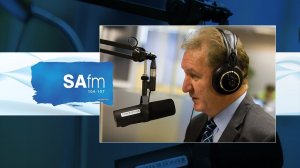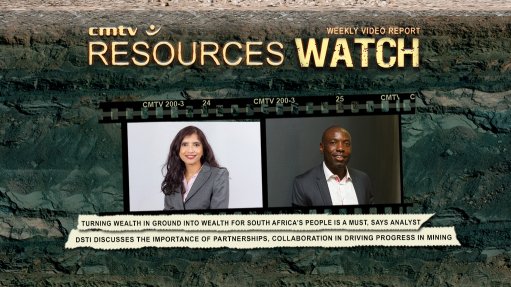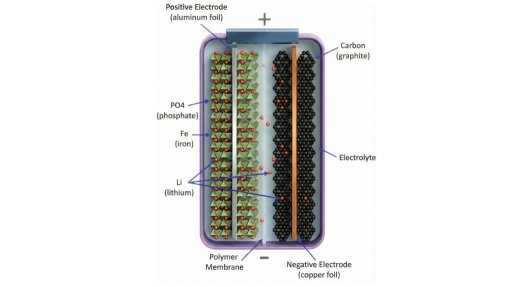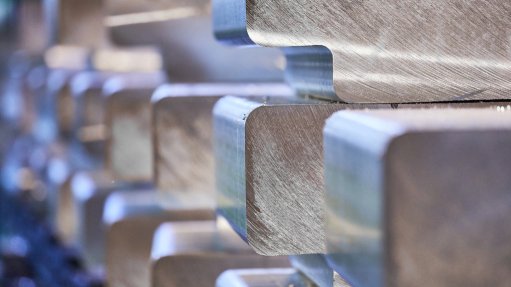On-The-Air (10/05/2024)

Martin Creamer talks about wind energy, a new copper mine and mineral exploration.
Every Friday, SAfm’s radio anchor Sakina Kamwendo speaks to Martin Creamer, publishing editor of Engineering News & Mining Weekly. Reported here is this Friday’s At the Coalface transcript:
Kamwendo: Wind energy generation at the big Gold Fields gold mine west of Johannesburg is drawing closer.
Creamer: Yes, one doesn't expect to have wind energy in Gauteng, but this is proving possible on the West Rand where you have got South Deep. It is a big gold mine. This gold mine is going to last another half a century. So they have been putting in solar power and thought they would also look to see if they can get wind power. They have had masts up now for nearly a year and they are very convinced that probably by the third quarter of this year, they will be able to take a decision on whether they go ahead.
There is only one drawback at the moment and that is an environmental one. So, they are doing an environmental impact study and why they are concerned is because their are colonies of bats there and they don't want the wind energy situation to affect those bats. So, that is really the big concern. When it comes to the rest, is feasible to go ahead with wind energy. It will be so important for this gold mine, because as we all know, the price of electricity has rocketed and it is affecting a lot of these mines. Gold price at the moment is so high, of course, that they are protected from that, but they still want to be able to generate their own electricity, because they can do it at such a lower price. Also, there is huge demands that you don't have coal energy anymore, they want clean energy and this wind energy and the solar power gives them that green credential, which the world is looking for.
Kamwendo: A new copper mine is opening ahead of schedule in South Africa’s copper-rich Northern Cape.
Creamer: These days, when you mentioned copper, everybody in mining wants to get into copper, because the world is electrifying and you can't electrify without copper. The world knows that it is short of copper, there are not enough mines going up at the moment. So, you can see the price of copper now lifting, people are talking about the level of $15000 so the price is really looking good. We see the whole Anglo American situation where BHP Billiton wants to get his hands on Anglo just to get that copper that they have got in Peru and elsewhere. With the Northern Cape moving now, you have got Copper 360, which just every month reports something more positive.
They are moving ahead very, very fast. Last month, they produced copper concentrate from a new processing plant and it derisked them because they have got their own processing plants going up, but they were able to get access to acquire an additional one, which gave a big boost to the whole outlook for them. Now this month, they reported that they are three months ahead of schedule, to go underground. When they produced that copper concentrate that were using surface material. Now, they have got an underground mine, Rietberg, that will go ahead in the next three months. Moreover, they are talking about 11 more mine there. So one can see how prospective that area was. Going back a few decades, there was a big copper hub there, but the copper price fell, and a lot of the mines closed.
We are now, from the South African point of view, able to go back to those mines and resuscitate them. This is what we see happening now with Copper 360 and also with Orion Minerals in the same Northern Cape province. We could become a big substantial copper producer here in South Africa, which would be very good for our economy, because we need those mineral exports to go out and to get the foreign exchange to come back to strengthen our rand, which is often vulnerable.
Kamwendo: South Africa’s economy can benefit quickly from getting mineral exploration going at pace.
Creamer: We put out a study in 2022 that we wanted to attract 5% of the world's dollars that are invested in exploration. We are only at 1% at the moment of the world dollars in exploration. It is an indication that we are going to shrink in mining unless we can get exploration going. There has been a big holdup in exploration, because the South African setup here was more orientated towards the private sector doing exploration. So, the private sector was the custodians of exploration.
Then in 1994, when we democratised, the government said we must follow what they do in Canada and Australia. The State must be the custodian of the endowments and all the minerals and metals, which meant investors were required to come through the State, but because the country wasn't really attuned to that, when the State set up a cadastre system, it turned out to be a disaster. Now, they are trying to get a new cadastre in place. They are working on it very, very hard. Involved are Canadians and others in all sorts of activities to try and get the cadastre going. But it takes time. Now, if South Africa’s private sector and its public sector can work together on this, I think it will speed things up, because the private sector still has its hands on a lot of information that they had gathered over decades. Hopefully, like we saw with energy, when the public and private sectors worked together, we saw things improving.
The same happened in logistics and rail. When in the public private sectors worked together, our logistics improved. Hopefully, once again, the public and private sectors can work together to speed up exploration, because exploration has the potential to get going very quickly and help the economy at the same time. Once permission is given to start exploring, the people with their drills come in fast and create economic activity fast and you have always got that hope that a mine will be developed. If there is a mine, it changes the whole economy of the region very, very fast. So there are hopes that we are going to get a mineral exploration going at pace so that we can enable economic growth to take place quickly.
Kamwendo: Thanks very much. Martin Creamer is publishing editor of Engineering News & Mining Weekly.
Article Enquiry
Email Article
Save Article
Feedback
To advertise email advertising@creamermedia.co.za or click here
Press Office
Announcements
What's On
Subscribe to improve your user experience...
Option 1 (equivalent of R125 a month):
Receive a weekly copy of Creamer Media's Engineering News & Mining Weekly magazine
(print copy for those in South Africa and e-magazine for those outside of South Africa)
Receive daily email newsletters
Access to full search results
Access archive of magazine back copies
Access to Projects in Progress
Access to ONE Research Report of your choice in PDF format
Option 2 (equivalent of R375 a month):
All benefits from Option 1
PLUS
Access to Creamer Media's Research Channel Africa for ALL Research Reports, in PDF format, on various industrial and mining sectors
including Electricity; Water; Energy Transition; Hydrogen; Roads, Rail and Ports; Coal; Gold; Platinum; Battery Metals; etc.
Already a subscriber?
Forgotten your password?
Receive weekly copy of Creamer Media's Engineering News & Mining Weekly magazine (print copy for those in South Africa and e-magazine for those outside of South Africa)
➕
Recieve daily email newsletters
➕
Access to full search results
➕
Access archive of magazine back copies
➕
Access to Projects in Progress
➕
Access to ONE Research Report of your choice in PDF format
RESEARCH CHANNEL AFRICA
R4500 (equivalent of R375 a month)
SUBSCRIBEAll benefits from Option 1
➕
Access to Creamer Media's Research Channel Africa for ALL Research Reports on various industrial and mining sectors, in PDF format, including on:
Electricity
➕
Water
➕
Energy Transition
➕
Hydrogen
➕
Roads, Rail and Ports
➕
Coal
➕
Gold
➕
Platinum
➕
Battery Metals
➕
etc.
Receive all benefits from Option 1 or Option 2 delivered to numerous people at your company
➕
Multiple User names and Passwords for simultaneous log-ins
➕
Intranet integration access to all in your organisation



















